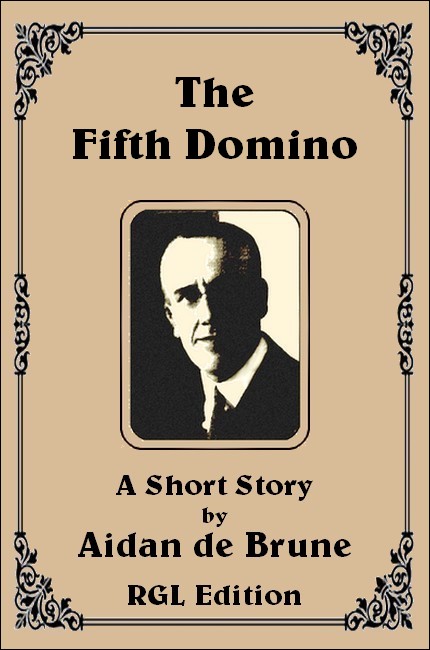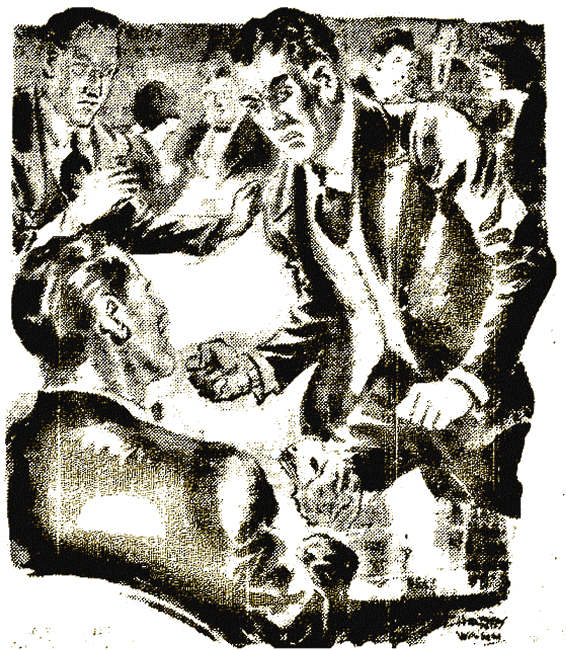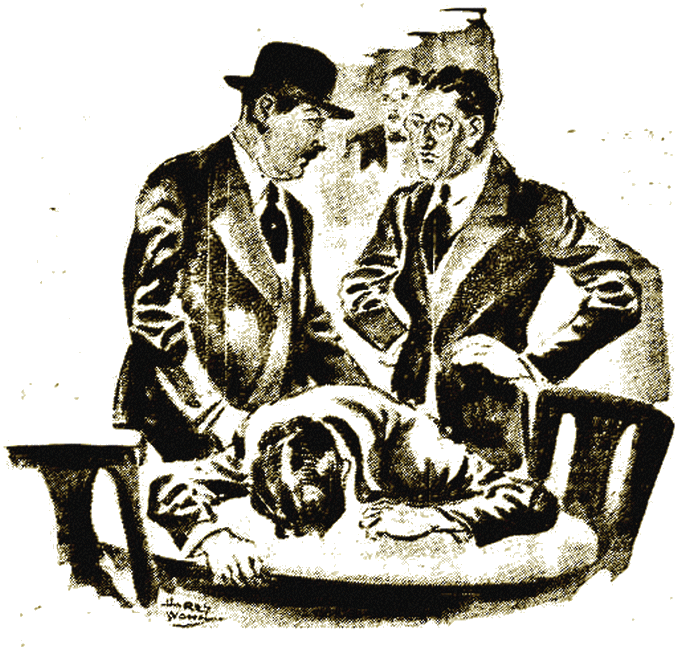
RGL e-Book Cover©
Roy Glashan's Library
Non sibi sed omnibus
Go to Home Page
This work is out of copyright in countries with a copyright
period of 70 years or less, after the year of the author's death.
If it is under copyright in your country of residence,
do not download or redistribute this file.
Original content added by RGL (e.g., introductions, notes,
RGL covers) is proprietary and protected by copyright.

RGL e-Book Cover©

AT the corner of Spencer and Bligh Streets is a large, underground café—the Mockingbird. It is not well known to the general public, but it is very popular among journalists and press writers, for it is within a few minutes' walk of many of the newspaper offices, and Mrs. Matson, the proprietress, has no objection to any "brother of the pen" spending a morning with a cup of coffee, reading or using her glass-topped table as a writing-desk.
For many years I have been a frequenter of the Mockingbird Café. A special writer on the Telegram, I have found it a convenient and quiet place for thought and effort. Besides, Mrs. Matson has quite an uncanny knowledge of when to refill the coffee-pot invariably at my elbow.
Brothers-of-the-pen! Yet, even among journalists there are cliques. Basil Frew, Guy Neilson, and myself staked out a claim to a table in the corner at the far end of the room. One or more of us were usually in residence there, writing or fooling away time with a box of dominoes.
I liked Basil Frew—and cared little for Guy Neilson. But Basil and Guy were great chums, and, perforce, I accepted Guy for Basil's sake. Again, Guy was a great domino player—and dominoes are a craze with me. I will often neglect important work for the sake of a Titanic battle with the cards. Guy's play fascinated me. It was at once daring and cautious, often developing unexpected results.
Some two months ago I noticed a coolness had come between Guy and Basil. A little while, watching, and I discovered the inevitable lady in the case. Basil had fallen in love with Gwen Lazenby, and Guy Neilson also had directed his fickle attentions in that direction.
For some time I watched the little comedy, with rather mixed feelings. Gwen was my friend and I did not relish Guy paying her attentions. I don't say that I enjoyed watching Basil's growing infatuation—but he was, at least, honourable. I knew of too many cases where misery had resulted from a woman's—er—friendship—with Guy Neilson.
I was still pondering over the eternal triangle when the tragedies at the Mockingbird horrified the city. I had come down to the café late, to find Basil and Guy engaged in a close contest with the cards. In spite of the gallant fight the former was making, I knew the result was a foregone conclusion. Basil could not hope to defeat Guy Neilson—it was all I could do, at the top of my form.
Suddenly Basil swept the cards into a heap, with a quick motion of his hand. Guy looked up, a puzzled frown on his face.
"I don't like these cards." Basil spoke in a low, intense voice. "There is something uncanny about them."
There was significance in his words. Guy Neilson sprang to his feet, his eyes blazing, his fists clenched.
"You infer I know them—that they are marked?" he asked, white with passion. "If you've got the pluck of a louse, you'll speak out and..."

"You infer I know them—that they are marked?"
"Is there any necessity to..."
"Cover your head, Basil!" I interposed, hastily. "There's nothing wrong with these cards. I've beaten Guy again and again with them. You think.... Oh, shut up!" I spoke angrily as he tried to interrupt. "Here! Let me get you a fresh box. If you beat him, Basil, the cards are crooked. If he licks you then—well, you know what to do."
Guy smiled, rather nastily, I thought, as I strode past him to the desk where the domino-boxes were stacked, and brought a fresh box to the table. In a few minutes the game was in progress. It ended, as I anticipated, in Basil's defeat. He stood up and held out his hand to his opponent, uttering a few words of apology in a sincere voice. Without waiting for a reply, he left the café.
"Have a game, Guy?" I asked, trying to cover an awkward interlude.
"May as well," he answered, indifferently. He shuffled the cards and waited for me to draw. "Matadore?"
"Of course." I drew seven cards. "Double-six?"
Guy played the double-five. For some time the game proceeded in silence. Luck was with me and I succeeded in "loading the donkey" heavily against my opponent.
"Hundred up?" inquired Guy. I nodded and drew cards. As I placed my opener on the table, Guy picked up one of the cards before him, examining it carefully.
"What's the matter?" I asked.
"Feels sticky." He wetted his handkerchief at his lips and rubbed the back of the card. "A speck of grease, I think."
That hand ended in Neilson's favour. The next draw resulted in very even cards and the hand was keenly fought. I won and Guy drew the cards together. Suddenly I placed my finger on one of them.
"That the card you said had a speck of grease on it, Neilson?" I asked quietly.
He picked up the card and looked at the face. It was the six-one—an important card in both the previous games. The back was smeared with something white, in a manner that made it easily recognisable.
"Yes," A slight flush stained the journalist's cheeks. He pulled out his handkerchief again, wetting it at his lips and scrubbing the back of the card hard. He had some trouble to get the grease off. At length, he flicked the card across the table to me. "Satisfied?"
"Perfectly." I drew cards. '"This hand should finish the game."
It did. Before half a dozen cards were on the table I had blanked both ends. Guy drew from kitty three cards and stopped. I waited, knowing that there was only one matadore in kitty and that I held the double-blank to counteract that. Even if he had the luck to draw the remaining matadore immediately, I could still force him to draw all the remaining cards.
A moment's hesitation and he picked another card. Then, more quickly, the fifth. He held this card for some time, gently rubbing it between his fingers. He had started to lay it down when a boy at his elbow spoke:
"Mr. Neilson! Mr. Fraser told me to bring you this and take back an answer."
With a word of apology Neilson slit the envelope and read the enclosure. He drew a pad of paper from his pocket and scribbled a few words. The sheets adhered tightly, and he separated them with a wetted forefinger. As he turned to hand the note to the boy he fell forward across the table.
In a moment the café was in confusion. I jumped to my feet, but before I could get round the table a man had reached the journalist's side. As he lifted the limp head I caught sight of the white face and knew that Guy Neilson was dead.
"Give me a hand here." The man spoke authoritatively. Noticing my questioning glance, he added: "I am Detective-Sergeant Blair."

"Give me a hand here...I am Detective-Sergeant Blair."
We lifted Guy from his chair to the floor. Blair sent one of the girls for a constable and ordered that no one leave the café. Motioning me to return to my seat, he drew out a chair and commenced to question me. While he talked he idly stacked the dominoes into their box.
In a few minutes the café resumed its usual quiet air, although many glances were thrown at the silent figure on the floor. I told Blair all that had happened. When I spoke of the keen battle with the cards I had just played with the dead man, Blair nodded understanding. I found out later that he is a brilliant domino player. The ambulance arrived, and I followed the corpse up the stairs, side by side with Blair. In the street he hesitated.
"Suppose I should take those dominoes," he muttered.
"I'll get them." Before he could refuse I was down the stairs. To my astonishment no box of dominoes stood on the table we had just vacated. I turned to one of the waitresses standing near.
"Nellie, where are our dominoes?"
"There." She pointed to a group preparing to commence a game. I went to them and explained matters. An exchange was quickly made, and I ran up the stairs to rejoin the detective. Ill-luck, however, dogged me. Half-way up the stairs I stumbled, and the box of dominoes rolled to the bottom of the flight, scattering the pieces in all directions. Before I had gathered them together again Blair came running down the stairs.
"What's the trouble?" he demanded. I explained my accident, and he grunted. He took the dominoes from me and ran up to the street, beckoning me to follow. At the police station he asked me to make a formal statement of the happenings. I was happy to do so; Blair seemed a very decent fellow.
I have been able to detail the first coming of the "horror" to the Mockingbird Café so fully, through Detective Blair's kindness in allowing me access to my formal statement, and the statements made by other persons in the café at that time and at subsequent happenings. I may add that the autopsy was fruitless. The doctors suspected some unknown poison—possibly of South American origin—but, as they could not prove that theory, fell back on some obscure heart trouble.
Blair was evidently puzzled—as well as hampered by the verdict of the Coroner's Court. I was puzzled myself, for I had a theory and wanted to prove it. I may say here that my fall on the stairs while carrying the dominoes was not entirely accidental. In the resultant confusion I managed to abstract the six-one, substituting another. The original six-one I took to a chemist friend, asking him to analyse any substance he could obtain from its surface.
He reported he could find nothing dangerous on it.
Two days later newspaper posters announced:
SUDDEN DEATH IN CITY CAFÉ
I eagerly grabbed a paper from the stall. Under the glaring streamer a three column heading asked: "IS IT MURDER?" and bold type announced:
The mystery surrounding the death of Guy Neilson at the Mockingbird Café on Monday deepened to-day when Austin Benner, well-known 'Mirror' roundsman, dropped dead as he left the building.
Benner, who was about to go on duty, had been playing dominoes...
I read no further. Here was food for thought. Guy Neilson had played dominoes in the Mockingbird, and had dropped dead, the coroner could not tell how. Austin Benner had been playing dominoes in the same place, and had met the same fate. What would the autopsy reveal?
My theory was that the last domino Neilson handled was poisoned. Yet the domino I had extracted from the pack, that the chemist had examined, had no trace of poison. That was the piece Neilson had been handling when he died—or had I in the confusion extracted the wrong card? It caused me much thought.
The next day another man died at the table in the Mockingbird. The police appeared impotent. The newspapers demanded action.
The autopsy on Benner had been as fruitless as the first. This, the third victim of the Mockingbird, had died in the same way, while playing dominoes!
When another death occurred on the day following the thoroughly perplexed police closed the café, pending the completion of their investigations.
When this move was made I placed the foregoing statement before Blair, who sent me the following notes on the case:—
I am Detective-Sergeant Blair mentioned in the foregoing statement, written by Mr. Boyd Kitson. I was in the Mockingbird Café when Mr. Guy Neilson died, and had charge of his and the subsequent deaths.
Mr. Kitson came to me yesterday and told me that he was in a position to give me the clue to the mystery. He asked that I would carefully read the above statement, and add to it anything I thought might elucidate the mystery. He had promised that if I will do this he will complete the statement, and the conclusion of the theory he is developing will reveal the name of the murderer—for he firmly believes that the mysterious deaths at the Mockingbird Café were the result of poison.
What grounds Mr. Kitson has for such a belief I cannot understand. At the time of Mr. Neilson's death I had the dominoes he had played with carefully examined. There was no sign of poison on their surface. I had the café carefully searched, and could discover nothing bearing out a theory of murder. The autopsy was remarkably vague. The doctors reported that the deaths might be the result of poison, but could not name any poison likely to give the known results.
I also investigated Mr. Neilson's private life, and while discovering that he was not generally liked—and had a most unenviable reputation regarding his dealings with women—could not discover any person who bore him any grudge of a magnitude that was likely to lead to murder.
One fact struck me as significant. While Mr. Neilson was known to be intimate with both Mr. Kitson and Mr. Frew there was evidence of bad feelings between all three men. For a time this gave rise in my mind to very strong suspicion against Mr. Kitson—but it was only suspicion and unprovable.
If these notes result in Mr. Kitson being able to solve the mysteries surrounding the Mockingbird Café, I take off my hat to him. I have never been engaged on a case with so little to go on—and so many clues that lead nowhere.
I gave Detective Blair this narrative with two objects. First, I hoped he would be able to add something to it that would help any reader to understand better the motives and impulses underlying the murders Blair declares to be mysteries. Secondly, I wanted to draw from him what he has confessed—that he suspected me of the murder of Guy Neilson. I do not know any of the other victims.
Neilson's death I might claim to be "The Perfect Crime." From Detective Blair's notes it is evident it is unsolvable by the police. But does that constitute a Perfect Crime? Is there such a thing?
I have promised to return this document to Detective Blair to-morrow, with such additions as will lead him to the person responsible for the deaths at the Mockingbird Café. To do this I must add one or two new points to my narrative.
The deaths following Guy Neilson astounded and perplexed me. The six-one domino which Neilson cleaned was the cause of his death. But I thought I had abstracted that from the box as I carried it up the stairs to Blair—or rather, as I gathered the dominoes from the ground after my accident.
The first death might have been a coincidence. The second one showed me that in some manner I had failed to recover the fatal fifth domino—it was still at the café, dealing death and destruction to all who handled it. It was for that reason I frequented the café—striving to trace the deadly piece. It was only following the last death that I was successful.
I have written enough to show that I murdered, wilfully, Guy Neilson—that I murdered, accidentally, the other three men. Why, you ask? Reader, there are only two causes for murder—jealousy and gain; and the greatest of these is jealousy.
Basil Frew and Guy Neilson loved Gwen Lazenby—each in his own way. I, too, loved Gwen Lazenby.
Before Basil Frew met her I thought I had a fair chance. I thought time would play into my hands—to win her. When she met Basil I knew that I had lost.
I planned the "Perfect Crime." I intended that Guy Neilson should die that Basil Frew should be suspected—and convicted—of his murder. I thought with both of them out of the way I would again have a chance of winning Gwen.
Yesterday I was told that Gwen and Basil had been quietly married, and had left the city on a long honeymoon trip. I laughed, for what had my "Perfect Crime" gained for me? It was then I commenced this manuscript. Now—it is completed.
To-morrow these sheets will be delivered to Detective Blair. He will come to the Mockingbird Café to arrest me. He will find me there—the fifth domino in my hands.
Roy Glashan's Library
Non sibi sed omnibus
Go to Home Page
This work is out of copyright in countries with a copyright
period of 70 years or less, after the year of the author's death.
If it is under copyright in your country of residence,
do not download or redistribute this file.
Original content added by RGL (e.g., introductions, notes,
RGL covers) is proprietary and protected by copyright.